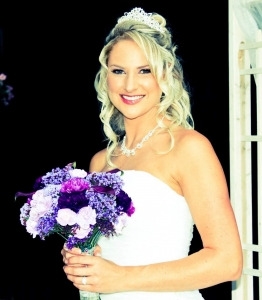STORIES FROM THE HEART: Bride provides lifesaving CPR to drowning toddler at wedding reception
By American Heart Association News

The wedding reception was winding down and guests were leaving when a woman’s screams pierced the night air.
A toddler who’d slipped away from his family was found at the bottom of the deep end of the swimming pool in the backyard where the nuptials were held.
The boy’s mother jumped in to rescue her child, but was frantic – so a cousin jumped in and pulled the boy out.
Groom James Pryor dialed 9-1-1, then sank into a chair and grabbed his face. Meanwhile, his new wife, Amber Pryor, rushed to where the child had been pulled from the pool and set on the ground.
“His face was white, white, white,” Amber said. “People were screaming, ‘He’s dead! He’s dead!’”
Only three days before, Amber had been retrained in CPR. She works at a cosmetic surgeon’s office in Dallas, and it’s a requirement for her job.
“I knew what to do,” she said. “I didn’t have to think about anything, I knew what to do next, no hesitation.”
Still in her wedding gown, Amber started CPR.
“I probably did maybe just 10 good chest compressions and the water started coming up,” she said. “So I flipped him over really fast and patted him on the back to get the water out.
“He was making the worst gurgling noises. I’ll probably never get that out of my head. He started crying, and then the paramedics came.”
***
The first time Amber learned CPR was more than 10 years ago. She was a gymnastics coach at a summer camp, and since she sometimes took the kids swimming, she had to be trained in CPR. She estimates that she’s been certified at least three times since then.
This last time – right before the wedding – Amber thought about her 5-year-old son and asked the instructor questions such as, “When do you use two fingers? When do you use one hand or two? What is best when dealing with a child?”
She’s always had an interest in medicine and is intrigued by the idea of working in the trauma field. Until then, she knows it’s good to have the training to save a life.
“Especially having a child,” she said. “You never know when you might need it for your child, or someone else’s child or an adult. You just never know.”
***

on their wedding day.
For Amber’s evening wedding, floating candles were placed in the pool. Guests noticed the little boy’s fascination with those candles. The theory is, he was reaching for one when he fell in.
“There are pictures where you can see him in the background, reaching for the candles,” she said.
The boy’s parents are obviously grateful for Amber’s lifesaving moment. The American Heart Association also presented Amber with a Heartsaver Hero award a few weeks after the accident almost a year ago (Sept. 15, 2012).
The American Heart Association helped pioneer CPR more than 50 years ago, and continues to refine this lifesaving technique. The organization trains over 14.5 million people each year in 60-plus countries. Even without formal training, anyone can be a lifesaver by remembering the steps to “Hands-Only CPR” – call 9-1-1, then push hard and fast in the center of the chest, preferably to the beat of the classic disco song, “Stayin’ Alive” until help arrives.
Today, the boy is in good shape.
“He’s a little rambunctious 2-year-old now,” said Amber, who lives in Heartland, Texas, about 25 miles east of Dallas. “You would never know that anything like that happened to him.”
While paramedics took the boy and his family to the hospital, Amber and James stayed behind, praying he was going to be OK.
Amber’s wedding dress, however, came away none the worse for wear. “It was a little black by the end of the night, but it’s OK,” she said. “I only plan on wearing it once.”
Photos courtesy of Amber Pryor





